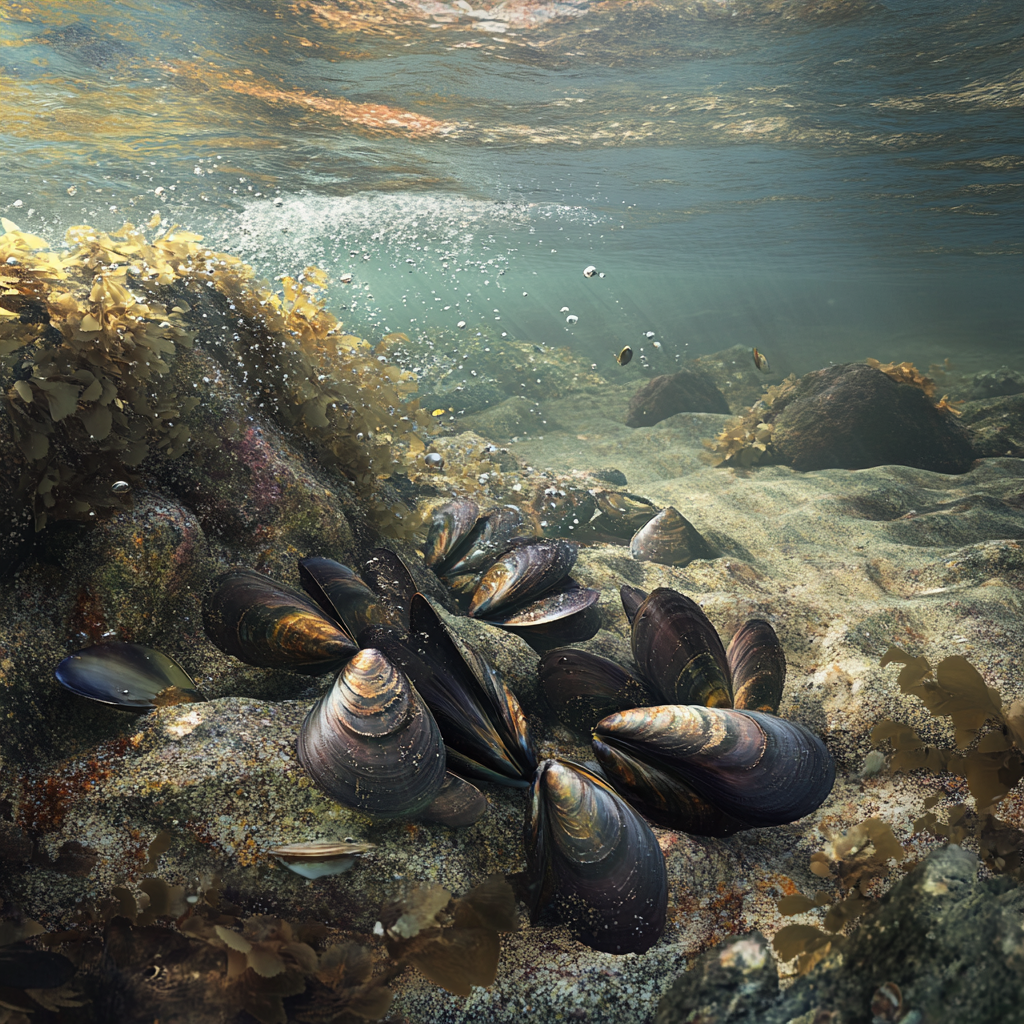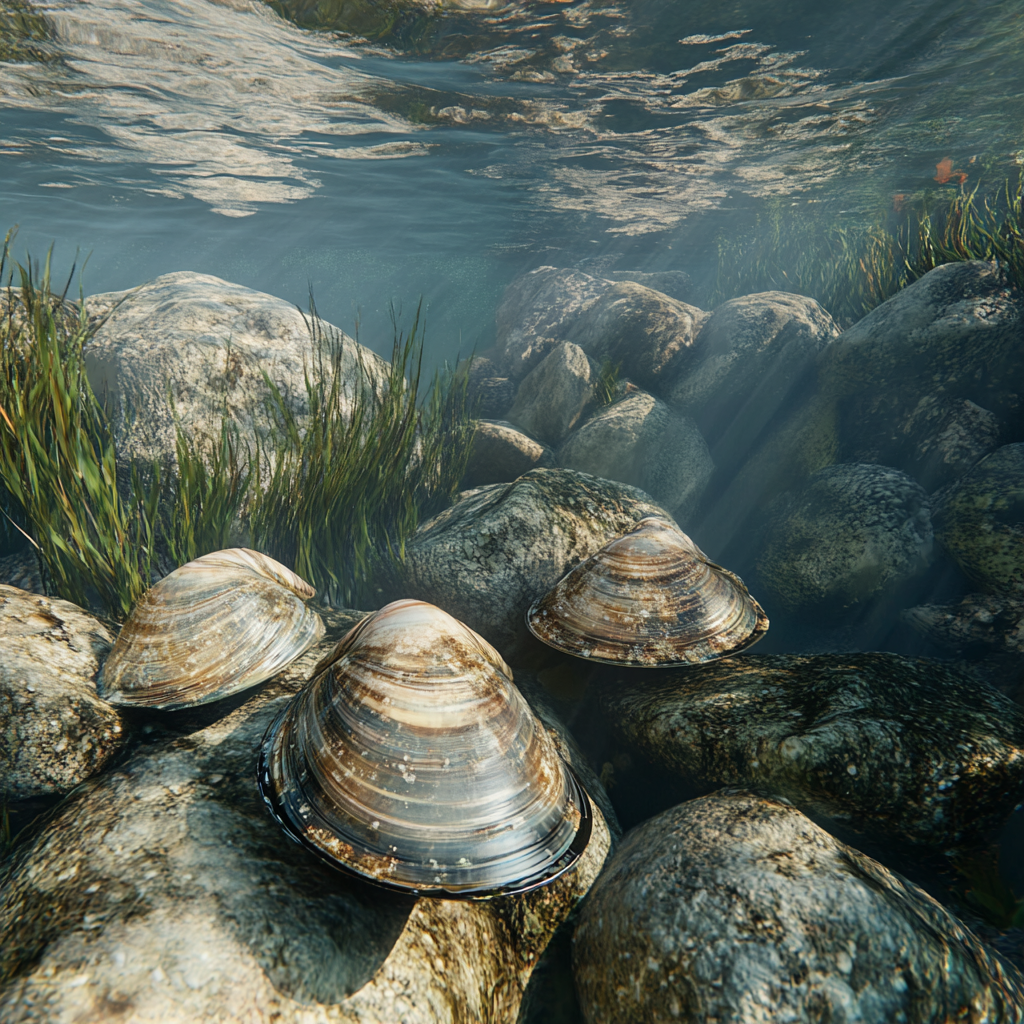Mussels are one of nature’s most efficient filter feeders, playing a crucial role in both aquatic ecosystems and human economies. Their ability to extract nutrients from the water not only helps them survive but also benefits the environment by improving water quality.
But what exactly is filter feeding, and why is it so important for mussels? In this article, we will explore the advantages of filter feeding in mussels, how it supports their survival, and why it is essential for maintaining healthy ecosystems.https://royalesrecipes.com/flex-mussels-recipe/
Why Is Filter Feeding Important for Mussels?
✔ Sustains Their Diet – Mussels don’t need to actively hunt for food; they extract nutrients directly from the water.
✔ Improves Water Quality – By removing excess plankton, algae, and debris, mussels act as natural water purifiers.
✔ Supports Marine Ecosystems – Mussels help maintain balance in aquatic environments by filtering pollutants.
✔ Contributes to Sustainable Seafood – Filter-feeding mussels grow without requiring additional feed, making them an eco-friendly seafood choice.
Now, let’s take a closer look at how filter feeding works and why it provides so many advantages for mussels.
What Is Filter Feeding?
Filter feeding is a feeding strategy used by mussels and other aquatic organisms to extract food particles from the water. Instead of actively hunting, mussels rely on their ability to filter plankton, organic matter, and nutrients from the surrounding environment.
How Do Mussels Filter Feed?
Mussels use their gills to filter particles from the water through a simple yet highly effective process:
- Water Intake: Mussels draw water into their incurrent siphon, bringing in plankton, algae, and organic debris.
- Filtration by Gills: Their specialized gills trap nutrient-rich particles while allowing clean water to pass through.
- Food Processing: The collected food is transported to the mouth, while unwanted particles are expelled.
- Water Expulsion: The filtered, cleaner water exits through the excurrent siphon, improving water quality in the surrounding environment.
How Do Mussels Compare to Other Filter Feeders?
Mussels are part of a larger group of filter feeders that play a crucial role in maintaining aquatic ecosystems. Here’s how they compare:
| Filter Feeder | Food Source | Filtration Method | Impact on Ecosystem |
|---|---|---|---|
| Mussels | Plankton, algae, detritus | Gills trap particles | Water purification |
| Oysters | Plankton, bacteria | Gills with mucus capture food | Improves water clarity |
| Sponges | Bacteria, plankton | Tiny pores absorb water | Removes waste from reefs |
| Whale Sharks | Small fish, plankton | Filters through gill rakers | Balances marine food chains |
Unlike mobile filter feeders like whale sharks, mussels stay in one place, continuously filtering their surrounding environment.
Now that we understand how mussels filter feed, let’s explore the key advantages of this feeding method.
Advantages of Filter Feeding in Mussels
Filter feeding provides mussels with several key advantages, allowing them to thrive in various aquatic environments while also benefiting the ecosystem. Here are the main biological and ecological advantages of filter feeding in mussels.https://phys.org/news/2019-08-mussels-super-filters-pollution.html
1. Nutrient Absorption and Sustained Diet
✔ Mussels feed on plankton, algae, and organic matter that naturally exist in the water.
✔ They do not need to actively search for food, conserving energy and effort.
✔ This feeding strategy allows mussels to survive in nutrient-rich and nutrient-poor environments alike.
2. Energy Efficiency and Low Metabolic Demand
✔ Unlike predators that need to hunt or chase prey, mussels can stay in one place and continuously feed.
✔ Their gills act as natural food filters, reducing the need for complex digestive processes.
✔ This low-energy feeding method allows mussels to allocate resources to growth and reproduction instead.
3. Self-Sustaining Food Source
✔ Mussels do not require external feeding or human intervention, making them a low-maintenance species.
✔ This makes mussel farming (aquaculture) a sustainable and environmentally friendly industry.
✔ Unlike farmed fish or shrimp, mussels don’t require artificial feed, reducing their environmental impact.
4. Adaptation to Different Environments
✔ Mussels can thrive in freshwater, brackish, and saltwater habitats.
✔ Their ability to filter food from various water sources makes them highly adaptive to changing ecosystems.
✔ Even in polluted or algae-rich environments, mussels continue to feed while helping to improve water conditions.
Filter feeding not only benefits mussels but also plays a crucial role in maintaining clean and balanced aquatic ecosystems. In the next section, we’ll explore how mussels contribute to water purification and ecological balance.
Ecological Benefits of Mussel Filter Feeding
Mussels don’t just benefit from filter feeding—they also play a crucial role in improving water quality and maintaining ecosystem balance. Their ability to filter large volumes of water provides multiple environmental advantages.

1. Water Purification and Improved Water Clarity
✔ Mussels act as natural water filters, removing suspended particles, excess nutrients, and harmful substances.
✔ A single mussel can filter up to 15 gallons (57 liters) of water per day, significantly improving water clarity.
✔ This helps control excess algae growth, which can otherwise lead to harmful algal blooms (HABs).
2. Reducing Harmful Algae and Excess Nutrients
✔ Mussels absorb excess nitrogen and phosphorus, which contribute to water pollution and algal overgrowth.
✔ By reducing these nutrients, mussels help prevent oxygen depletion (hypoxia) in water bodies.
✔ This supports healthier ecosystems by maintaining stable oxygen levels for other aquatic species.
3. Supporting Marine and Freshwater Ecosystems
✔ Mussel beds create habitats for other species, including fish, crabs, and small invertebrates.
✔ Their presence stabilizes sediment, preventing shoreline erosion.
✔ Mussels reduce waterborne bacteria by consuming organic debris and microorganisms.
4. Helping to Restore Polluted Waterways
✔ Mussels are used in eco-restoration projects to clean lakes, rivers, and coastal waters.
✔ In urban waterways, mussel populations help filter pollutants from industrial and agricultural runoff.
✔ Some conservation projects have successfully used mussels to rehabilitate damaged aquatic ecosystems.
Real-World Impact: How Mussels Improve Water Quality
In areas like the Chesapeake Bay and the Great Lakes, mussels have been introduced to help combat pollution. Their filter-feeding abilities have:
- Reduced nitrogen levels, improving water quality.
- Decreased algae overgrowth, restoring balance to ecosystems.
- Supported fish populations, leading to healthier fisheries.
By acting as nature’s water filters, mussels contribute to a cleaner, healthier aquatic environment. In the next section, we’ll explore how these benefits extend to human industries and environmental conservation efforts.
Economic and Environmental Importance of Mussel Filter Feeding
Beyond their ecological benefits, mussels also provide economic and environmental advantages. Their ability to filter water efficiently makes them valuable for sustainable aquaculture, seafood industries, and environmental conservation projects.
1. Mussels in Sustainable Aquaculture
✔ Mussel farming is one of the most eco-friendly seafood industries because mussels require no artificial feed, fertilizers, or antibiotics.
✔ Unlike fish farms, mussel aquaculture reduces pollution instead of contributing to it.
✔ Mussel farms create natural water filtration systems, helping maintain clean coastal waters.
2. Improving Water Quality in Coastal Areas
✔ Mussel beds have been used in marine conservation projects to restore polluted waters.
✔ Some cities have introduced mussel farms to clean industrial and agricultural runoff in rivers and estuaries.
✔ This method is cost-effective and requires minimal human intervention.
3. Role in the Seafood Industry
✔ Mussels are affordable and widely available, making them an important part of the global seafood market.
✔ Since mussels absorb nutrients from their surroundings, growing them in clean water environments ensures high-quality seafood production.
✔ Countries like the Netherlands, New Zealand, and Canada have large-scale mussel farming operations that support local economies.
4. Contribution to Carbon Sequestration and Climate Action
✔ Mussels help remove excess carbon dioxide from the water, contributing to ocean acidification reduction.
✔ Their shells store calcium carbonate, which helps regulate pH levels in marine ecosystems.
✔ This makes mussels a natural solution to combat climate change in aquatic environments.
5. Protecting Shorelines and Preventing Erosion
✔ Mussel beds stabilize coastal and riverbank sediment, reducing erosion from waves and currents.
✔ They provide natural barriers that protect wetlands and estuaries from storm damage.
✔ This function is especially valuable in regions affected by climate change and rising sea levels.
Final Thoughts on Mussels and Environmental Conservation
Because of their ability to filter feed, mussels serve as natural water purifiers, habitat builders, and climate protectors. Their environmental benefits make them crucial to both natural and human-made ecosystems.
In the next section, we’ll answer common questions about mussel filter feeding and its impact on the environment.
Frequently Asked Questions About Mussel Filter Feeding
Mussels play a crucial role in water purification and ecosystem health, but many people have questions about how their filter-feeding process works. Here are answers to some of the most common questions.
1. How Much Water Can a Mussel Filter in a Day?
✅ A single mussel can filter between 10 to 15 gallons (38 to 57 liters) of water per day.
✅ Large mussel beds can filter millions of gallons of water daily, significantly improving water clarity.
2. Do All Mussels Filter Feed?
✅ Yes, all species of mussels are filter feeders, but some are more efficient than others.
✅ Freshwater mussels and saltwater mussels both use their gills to capture plankton, algae, and organic particles from the water.
3. Can Mussels Help Reduce Water Pollution?
✅ Yes! Mussels absorb excess nitrogen, phosphorus, and other pollutants, helping to prevent harmful algal blooms.
✅ They can also filter microplastics and bacteria, improving overall water quality.
4. Are Filter-Feeding Mussels Safe to Eat?
✅ Mussels from clean waters are safe and healthy to eat.
🚫 However, mussels from polluted waters may contain toxins, heavy metals, or bacteria, making them unsafe for consumption.
✅ This is why mussels in commercial seafood production are harvested from clean, regulated environments.
5. How Do Mussels Improve Aquatic Ecosystems?
✅ Mussels provide:
- Cleaner water by removing debris and excess nutrients.
- Habitats for small marine life, creating a stable ecosystem.
- Erosion control by stabilizing riverbeds and coastal shorelines.
6. Can Mussels Be Used for Water Purification Projects?
✅ Yes! Scientists and conservationists use mussels in water restoration projects to help clean polluted lakes, rivers, and coastal areas.
✅ In places like the Chesapeake Bay, mussels have been introduced to filter pollutants and restore marine biodiversity.
Final Thoughts on Mussel Filter Feeding
Mussels are not only self-sustaining creatures but also natural water purifiers that help keep aquatic environments clean and balanced. Their ability to filter out toxins, improve water clarity, and support ecosystems makes them an essential part of both marine and freshwater habitats.
Conclusion
Mussels are more than just a popular seafood—they are natural water purifiers that play a vital role in maintaining clean and healthy aquatic ecosystems. Their ability to filter feed provides multiple benefits, both for their own survival and for the environment.
Key Takeaways:
✔ Filter feeding helps mussels absorb nutrients efficiently, allowing them to thrive without needing external food sources.
✔ Mussels improve water quality by removing plankton, algae, and pollutants, making them crucial for ecosystem balance.
✔ They support marine biodiversity by creating habitats for fish and other aquatic organisms.
✔ Mussels contribute to sustainable seafood production, requiring no artificial feed or chemicals.
✔ They are used in environmental restoration projects to help clean polluted waterways.
Because of these advantages, mussels are increasingly recognized as valuable assets in aquaculture, marine conservation, and climate action. Whether in natural habitats, seafood farming, or water purification efforts, mussels continue to prove that filter feeding is one of nature’s most efficient survival strategies.
By understanding the benefits of mussel filter feeding, we can better appreciate their ecological importance and potential for environmental protection.

